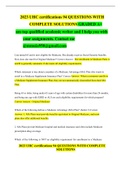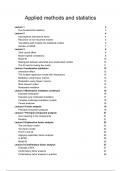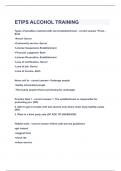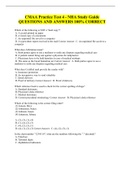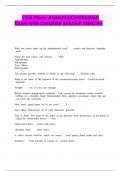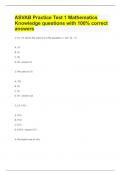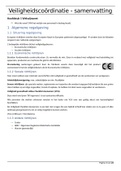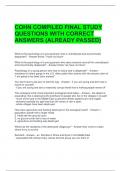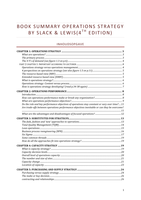Unit 1 Topic 1: Democracy and Participation
Evaluate the advantages of direct democracy
Evaluate the view that greater use of direct democracy will solve the
participation crisis (add analysis that therefore this increases participation and
vice versa)
Some statistics for the intro:
o Voter turnout - all time low in recent years - 2001: 59.4%, 2010 -
65.2%, 2019 - 67.3%
o The 2011 AV referendum got a turn out of just 42. 2%.
Paragraph 1:
It is the purest form of democracy and encourages participation. Direct
Democracy can increase voter turnout.
Direct democracy can increase voter turnout
o E.g. 85% turnout at 2014 Scotland independence referendum →only 50% in
the previous Scottish parliament election.
o 80% turnout at Northern Ireland ‘Good Friday’ agreement referendum 1998
o Aftermath of a referendum parties saw an increase in membership
Give the general public direct and unmediated control over government decision-
making in regards to particular topics
Ensures public opinions are heard- freedom of speech.
The only true form of democracy (rule by the people), especially as parties and pressure
groups are often run by elites pursuing their own agendas, not truly representing the
people).
Politicians may be corrupt and incompetent and put loyalty to their party before
responsibility to the electorate or betray election promises. Cabinet members put their
party above the needs of their constituents.
Direct democracy is ineffective as the public is often ill-informed on issues.
This means that decisions made in referendums are practically void.
The public is often Ill-informed on issues of a referendum
o They have a lack of political experience
o Moreover, voters may just vote according to their beliefs in the moment and
not have the ability to show a holistic view of the political and economic
situation. They can regret their decisions later.
o There are very few referendums in the UK, therefore people are not informed
on how they work etc.
o People are vulnerable to being swayed by campaigning, with brexit 51%
voted for it in 2016, if it was held today only 40% would vote leave. Enacts
change that the public are unable to comprehend.
Paragraph 2:
Direct democracy can cause tyranny of the majority.
, Tyranny of the majority
o The 2016 Brexit referendum had a minority of 48.1% of voters leaving 51.9%
of voters dictating the course of the future. Barely a majority. Significant
number of people did not agree, yet it was to be done. Unfair.
o Only needs a 50% majority, meaning 49.9% of the country could disagree, yet
it would be done. Very unfair and not truly representative of the majority.
1979 scottish devolution, 52% to 48%
1997 welsh devolution, 50.3% to 49.7%
o Majority can decide on issues that affect everyone and have massive
repercussions. This is unfair.
Impractical in a large, heavily populated modern state where decision-making is
complicated
Tyranny of the majority is not a problem.
Tyranny of the majority is not a problem
o There will always be a majority of any vote. It should be respected. It is
utilitarian. Moreover, minute majorities are uncommon.
2014 scottish independence referendum, 45% to 55%
1975 EU membership referendum,67% to 33%
2004 North East England devolution referendum, 78% to 22%.
Gives weight to equal votes, unlike a representative system where the varying sizes of
constituencies mean that votes do not all have equal value. Under FPTP there exists
safe seats which gives contested seats undue importance.
Paragraph 3:
Direct democracy is decisive. In times of government divide, referendums can
give clear direction.
One has to adhere to referendums as they are the purest form of the people’s will.
This prevents deadlock and delay and provides for effective governance.
o E.g. 1975 referendum on whether the UK should remain in the EC. The
Labour government at the time was deeply conflicted, however the
referendum result gave the government clear direction.
o The 2016 EU referendum saw Cameron’s conservatives divided over Brexit,
and so the issue was put to the people who voted to leave. This gave the
government clear direction. They had to produce the people’s will, effective
governance.
Direct democracy leaves MPs unaccountable.
It's not the MPs fault if the outcome of a referendum is not desirable.
o MPs campaign during referendums and have significant sway over voters; in
this sense they should be accountable for the outcome of a referendum yet
they are not.
, MPs use referendums as a political tool to get legitimacy for legislation without
having to worry about any backlash
o They frame the question and put it to the public. They can produce a
referendum question that gives them a certain desired outcome. Yet they
can't receive backlash.
MPs do not have to take an unpopular position on a controversial issue and risk
ruining their reputation
o Corbyn 2016 referendum, he showed eurosceptic views yet did not declare
his own position. After the outcome he became anti-Brexit to criticise the
Conservatives. He was accountable for his actions.
Evaluate the advantages of representative democracy
Citizens within a country elect representatives to make decisions for them.
Paragraph 1:
MPs are accountable.
For five years, MPs are responsible to the electorate. In this way they are held
accountable to them. If they fail to perform they can be removed by the people
of their constituency. The people exercise control over their representatives.
o This means that the voters ultimately retain sovereignty because they decide
whether or not to renew the mandate of their representatives.
o Jo Swinson was ousted in the 2019 GE.
MPs are accountable through by-elections. A by-election is held when a seat
becomes vacant when an MP is convicted of a serious criminal offence, for
example.
o In North Shropshire, Owen Paterson, Dec 2021.
MPs are loyal to their party or their own conscience, not the electorate. They
are also unaccountable and can practically do as they please.
Some MPs believe that they should act in accordance to their conscience
regardless of party and electorate stance. This gives such an MP the flexibility
to ignore the wishes of both his party and his constituency – this is not
democratic.
o Invites corruption- MPs can practically do as they please. Peter
viggers, duck house expenditure.
It is common for MPs to vote the way their party tells them to, and not in the
best interest of their constituency.
o A number of Conservative MPs oppose fracking, but they have been
told they must oppose the Labour motion to ban fracking or face
expulsion from the parliamentary party. Under the Truss government.
Whips. Three line whip.
o Careerism- Truss voted remain but then as FS, supported the leave
campaign.
, Powerful pressure groups and lobbyists and the London-based media
establish a self-perpetuating Westminster ‘bubble’ which disconnects the
voters from their representatives.
MPs can have outside interests, including second jobs (as long as they
declare them), which can further contribute to a conflict of interests and
compromise their ability to fully represent their constituents. George Osborne,
the former chancellor of the exchequer, for example, became editor of the
Evening Standard while still an MP.
Paragraph 2:
MPs are knowledgeable politicians and are an effective means of governance.
Those who desire to be elected are knowledgeable in the field.
o They are therefore more likely to make politically educated decisions
than most members of the public, who may be swayed by emotion and
may not fully understand the complexities of a question. For example,
before a parliamentary bill is enacted it will have been carefully drawn
up by ministers and civil servants, debated in both the House of
Commons and the House of Lords, and been further analysed in
committee stage when amendments may be added to it.
MPs Summarise the issues of when proposing legislation- effective. Not
thousands of buts of legislation for some.
o Trustee model. MP Andy Slaughter takes into account the views of all
rather than the few.
There is low voter turnout.
Under the first past the post system many feel as if their vote doesn't count. It
is why many people do not vote.
o 67.3% in 2019 GE.
o 59.4% 2001 GE.
Lack of participation - no one to stop the government from becoming too
dictatorial and undemocratic - breakdown in communication between the
government/electorate.
If citizens are having a little influence in politics, democracy weekends as it is
no longer really a government of the people by the people and for the people.
The 2011 AV referendum got a turn out of just 42. 2%.
Paragraph 3:
Not everyone is represented. The government produces undesirable
outcomes.
Evaluate the advantages of direct democracy
Evaluate the view that greater use of direct democracy will solve the
participation crisis (add analysis that therefore this increases participation and
vice versa)
Some statistics for the intro:
o Voter turnout - all time low in recent years - 2001: 59.4%, 2010 -
65.2%, 2019 - 67.3%
o The 2011 AV referendum got a turn out of just 42. 2%.
Paragraph 1:
It is the purest form of democracy and encourages participation. Direct
Democracy can increase voter turnout.
Direct democracy can increase voter turnout
o E.g. 85% turnout at 2014 Scotland independence referendum →only 50% in
the previous Scottish parliament election.
o 80% turnout at Northern Ireland ‘Good Friday’ agreement referendum 1998
o Aftermath of a referendum parties saw an increase in membership
Give the general public direct and unmediated control over government decision-
making in regards to particular topics
Ensures public opinions are heard- freedom of speech.
The only true form of democracy (rule by the people), especially as parties and pressure
groups are often run by elites pursuing their own agendas, not truly representing the
people).
Politicians may be corrupt and incompetent and put loyalty to their party before
responsibility to the electorate or betray election promises. Cabinet members put their
party above the needs of their constituents.
Direct democracy is ineffective as the public is often ill-informed on issues.
This means that decisions made in referendums are practically void.
The public is often Ill-informed on issues of a referendum
o They have a lack of political experience
o Moreover, voters may just vote according to their beliefs in the moment and
not have the ability to show a holistic view of the political and economic
situation. They can regret their decisions later.
o There are very few referendums in the UK, therefore people are not informed
on how they work etc.
o People are vulnerable to being swayed by campaigning, with brexit 51%
voted for it in 2016, if it was held today only 40% would vote leave. Enacts
change that the public are unable to comprehend.
Paragraph 2:
Direct democracy can cause tyranny of the majority.
, Tyranny of the majority
o The 2016 Brexit referendum had a minority of 48.1% of voters leaving 51.9%
of voters dictating the course of the future. Barely a majority. Significant
number of people did not agree, yet it was to be done. Unfair.
o Only needs a 50% majority, meaning 49.9% of the country could disagree, yet
it would be done. Very unfair and not truly representative of the majority.
1979 scottish devolution, 52% to 48%
1997 welsh devolution, 50.3% to 49.7%
o Majority can decide on issues that affect everyone and have massive
repercussions. This is unfair.
Impractical in a large, heavily populated modern state where decision-making is
complicated
Tyranny of the majority is not a problem.
Tyranny of the majority is not a problem
o There will always be a majority of any vote. It should be respected. It is
utilitarian. Moreover, minute majorities are uncommon.
2014 scottish independence referendum, 45% to 55%
1975 EU membership referendum,67% to 33%
2004 North East England devolution referendum, 78% to 22%.
Gives weight to equal votes, unlike a representative system where the varying sizes of
constituencies mean that votes do not all have equal value. Under FPTP there exists
safe seats which gives contested seats undue importance.
Paragraph 3:
Direct democracy is decisive. In times of government divide, referendums can
give clear direction.
One has to adhere to referendums as they are the purest form of the people’s will.
This prevents deadlock and delay and provides for effective governance.
o E.g. 1975 referendum on whether the UK should remain in the EC. The
Labour government at the time was deeply conflicted, however the
referendum result gave the government clear direction.
o The 2016 EU referendum saw Cameron’s conservatives divided over Brexit,
and so the issue was put to the people who voted to leave. This gave the
government clear direction. They had to produce the people’s will, effective
governance.
Direct democracy leaves MPs unaccountable.
It's not the MPs fault if the outcome of a referendum is not desirable.
o MPs campaign during referendums and have significant sway over voters; in
this sense they should be accountable for the outcome of a referendum yet
they are not.
, MPs use referendums as a political tool to get legitimacy for legislation without
having to worry about any backlash
o They frame the question and put it to the public. They can produce a
referendum question that gives them a certain desired outcome. Yet they
can't receive backlash.
MPs do not have to take an unpopular position on a controversial issue and risk
ruining their reputation
o Corbyn 2016 referendum, he showed eurosceptic views yet did not declare
his own position. After the outcome he became anti-Brexit to criticise the
Conservatives. He was accountable for his actions.
Evaluate the advantages of representative democracy
Citizens within a country elect representatives to make decisions for them.
Paragraph 1:
MPs are accountable.
For five years, MPs are responsible to the electorate. In this way they are held
accountable to them. If they fail to perform they can be removed by the people
of their constituency. The people exercise control over their representatives.
o This means that the voters ultimately retain sovereignty because they decide
whether or not to renew the mandate of their representatives.
o Jo Swinson was ousted in the 2019 GE.
MPs are accountable through by-elections. A by-election is held when a seat
becomes vacant when an MP is convicted of a serious criminal offence, for
example.
o In North Shropshire, Owen Paterson, Dec 2021.
MPs are loyal to their party or their own conscience, not the electorate. They
are also unaccountable and can practically do as they please.
Some MPs believe that they should act in accordance to their conscience
regardless of party and electorate stance. This gives such an MP the flexibility
to ignore the wishes of both his party and his constituency – this is not
democratic.
o Invites corruption- MPs can practically do as they please. Peter
viggers, duck house expenditure.
It is common for MPs to vote the way their party tells them to, and not in the
best interest of their constituency.
o A number of Conservative MPs oppose fracking, but they have been
told they must oppose the Labour motion to ban fracking or face
expulsion from the parliamentary party. Under the Truss government.
Whips. Three line whip.
o Careerism- Truss voted remain but then as FS, supported the leave
campaign.
, Powerful pressure groups and lobbyists and the London-based media
establish a self-perpetuating Westminster ‘bubble’ which disconnects the
voters from their representatives.
MPs can have outside interests, including second jobs (as long as they
declare them), which can further contribute to a conflict of interests and
compromise their ability to fully represent their constituents. George Osborne,
the former chancellor of the exchequer, for example, became editor of the
Evening Standard while still an MP.
Paragraph 2:
MPs are knowledgeable politicians and are an effective means of governance.
Those who desire to be elected are knowledgeable in the field.
o They are therefore more likely to make politically educated decisions
than most members of the public, who may be swayed by emotion and
may not fully understand the complexities of a question. For example,
before a parliamentary bill is enacted it will have been carefully drawn
up by ministers and civil servants, debated in both the House of
Commons and the House of Lords, and been further analysed in
committee stage when amendments may be added to it.
MPs Summarise the issues of when proposing legislation- effective. Not
thousands of buts of legislation for some.
o Trustee model. MP Andy Slaughter takes into account the views of all
rather than the few.
There is low voter turnout.
Under the first past the post system many feel as if their vote doesn't count. It
is why many people do not vote.
o 67.3% in 2019 GE.
o 59.4% 2001 GE.
Lack of participation - no one to stop the government from becoming too
dictatorial and undemocratic - breakdown in communication between the
government/electorate.
If citizens are having a little influence in politics, democracy weekends as it is
no longer really a government of the people by the people and for the people.
The 2011 AV referendum got a turn out of just 42. 2%.
Paragraph 3:
Not everyone is represented. The government produces undesirable
outcomes.

